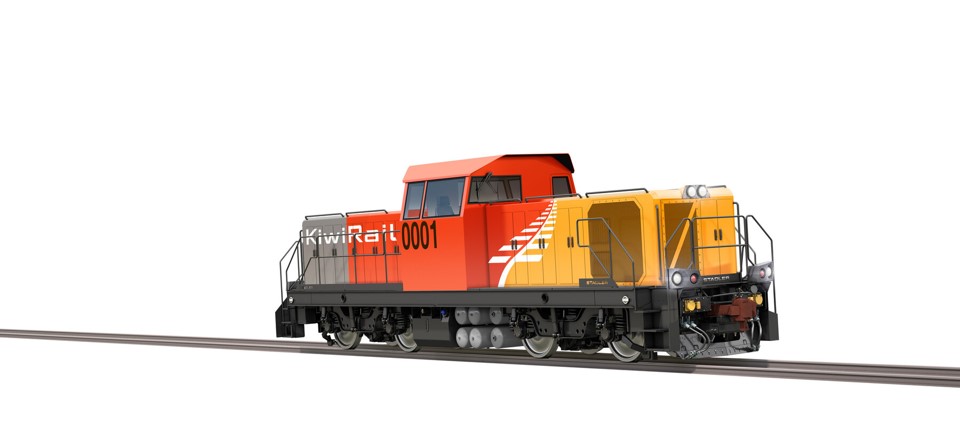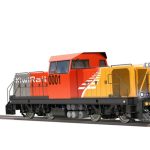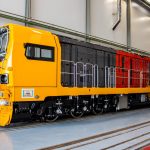 Stadler and the national railway operator of New Zealand, KiwiRail, signed two additional contracts for the supply of 33 mainline and shunting locomotives.
Stadler and the national railway operator of New Zealand, KiwiRail, signed two additional contracts for the supply of 33 mainline and shunting locomotives.
The first contract involves the delivery of 9 mainline locomotives equipped with ETCS for seamless operation on the North Island. The second agreement includes the supply of 24 innovative hybrid battery-diesel yard shunt locomotives, along with spare parts, specialized tools, and technical support services.
Stadler is currently manufacturing the 57 DM class narrow gauge locomotives, ordered by KiwiRail in 2021, to be used primarily for mainline services on the South Island rail network. Under the new agreement, both companies have expanded their commitment with an additional order for nine DM class locomotives that will be equipped with ETCS technology for deployment on the North Island rail network. Additionally, the last ten Class DM locomotives from the first order in 2021, will also be fitted with ETCS bringing the total number of ETCS fitted DM class locomotives in the North Island to 19. ETCS will enable the DM class locomotive to safely and seamlessly operate in the Auckland Metro area that is fitted with ETCS Level 1 trackside signalling system. This initiative also future proofs the DM class locomotive to safely operate in the Wellington Metro area when that trackside signalling system has been upgraded to ETCS.
As part of the second agreement, Stadler will supply 24 hybrid battery-diesel narrow-gauge yard shunt locomotives featuring a central cab and a maximum axle load of 16 tonnes. The new yard shunt locomotives are specifically designed to operate within all shunting areas belonging to KiwiRail. Thanks to the on-board battery module, the locomotive will primarily operate as zero-emission vehicle, significantly contributing to the reduction of KiwiRail’s shunting operations carbon-footprint. The comprehensive contract also includes spare parts, special tools and technical services. The yard shunt locomotives will be designed to be operated from outside the driving cab within the shunting yard limits by means of a safe and resilient remote-control system.
The agreement for the new mainline and shunting locomotives are part of the KiwiRail’s USD 1.7 billion investment in rolling stock that “would enable KiwiRail to deliver better service to its customers and further enhance the New Zealand freight market’s access to low carbon emission transport. The locomotives will also be deployed on the tourism routes where travellers demand low carbon options,” KiwiRail Chief Customer and Growth Officer Adele Wilson said. The new locomotives “mean less maintenance time in the depots and more time on the track reliably serving our customers. We welcome the advantages in up-to-date technology our long-term relationship with Stadler brings, especially to our goal of decarbonisation,” Adele Wilson underlines.
The mainlines locomotives will contribute to getting more freight off the roads and onto the railways. A low-emission diesel engine, boasting an impressive 3,000 kW output, powers these Co-Co locomotives. Compliant with the latest European emission standard (Stage V), they not only achieve a substantial reduction in pollutant emissions but also optimize combustion, resulting in lower fuel consumption and reduced greenhouse gases emissions. They are designed for the use with HVO bio-fuels, which contribute to the reduction of over 80% of CO2eq emissions (calculated along the entire value chain of the product).
Customized to meet KiwiRail requirements, the narrow gauge and narrow body locomotives feature service proven components and systems. The two cabs also offer optimal visibility and an exceptional working environment for the drivers, including ergonomic desks. Two external walkways connect both cabs and provide direct access to main equipment for maintenance purposes.
The Bo-Bo yard shunt locomotives will combine high performance and efficiency of the AC traction system with the flexibility and environmental-friendly hybrid traction. Designed for both cabin and external operation, these locomotives will feature a Remote Control System for enhanced versatility. Same as for the DM class mainline locomotives, the new yard shunt locomotives are equipped with an Automatic Engine Start-Stop System (AESS) to minimize fuel consumption, noise, and emissions, as well as a remote diagnostic and conditioning monitoring system. These locomotives represent an innovative solution for sustainable and efficient shunting operations.
Share on:





